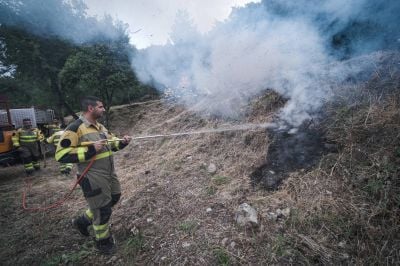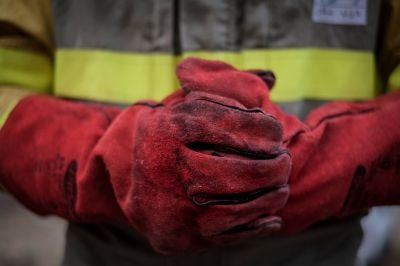Khaled Taleb, founder of the Akkar Trail nature NGO, shows firefighting trainees how to stop a forest fire. (Credit: João Sousa/L'Orient Today/File photo)
Climate change is driving up more intense and frequent heatwaves, which in turn generate a "witch's brew" of pollutants, threatening the health of humans and all living things, the UN warned Wednesday.
The wildfire smoke that recently suffocated cities from Athens to New York may be the most visible sign of air pollution caused by heatwaves. Among the countries at risk is Lebanon, where a hot and dry summer season has resulted in dozens of damaging wildfires.
"We are not properly monitoring air quality and the impact of air quality on these stations," the UN said.
In Lebanon, that means the exact scope of the harm done by this summer's heatwaves and fires is not yet clear, according to George Mitri, director of the Land and Natural Resources Program at the University of Balamand. The program analyzes forest fires across Lebanon and runs an online platform tracking wildfire risks based on weather data.
Though the year's total burned land area is still below average, the fire severity index remains high — in other words, weather conditions remain favorable for sparking harmful wildfires. "It was not an easy year," Mitri said. "We still have two months ahead of us [in the fire season]," he added.
"We are in a very critical situation given all the fires in other countries in the Mediterranean fueled by heatwaves. We have to be prepared."
Motor vehicles and poor zoning for industrial facilities in Lebanon also pose a major threat to public health, with residents exposed to harmful pollutants, Mitri explained.
And as global temperatures reach all-time highs, extreme heat can also induce a host of other chemical processes that are hazardous for human health, the World Meteorological Organization (WMO) said in its annual Air Quality and Climate Bulletin.
"Heatwaves worsen air quality, with knock-on effects on human health, ecosystems, agriculture and indeed our daily lives," WMO chief Petteri Taalas said in a statement.
A new study by the Energy Policy Institute at the University of Chicago suggested that fine particulate pollution from sources such as vehicle and industrial emissions, sand and wildfires is "the greatest external threat to public health" worldwide.
"Climate change and air quality cannot be treated separately," Taalas stressed.
"They go hand-in-hand and must be tackled together to break this vicious cycle."
'More extreme'
While Wednesday's report was based on 2022 data, Taalas cautioned that in terms of temperatures, "what we are witnessing in 2023 is even more extreme."
On Wednesday, the European Union's Copernicus climate monitor said 2023 was likely to be the hottest year in human history, after the last three months were the warmest ever recorded.
That, in turn, is potentially bad news for air quality.
"Air quality and climate are interconnected because the chemical species that affect both are linked," the WMO said.
"The substances responsible for climate change and for the degradation of air quality are often emitted by the same sources, and... changes in one inevitably cause changes in the other."
The WMO pointed for instance to how the combustion of fossil fuels emits carbon dioxide and nitrogen oxide into the atmosphere.
These are not only heat-trapping greenhouse gases, but potential precursors of pollutants such as ozone and nitrate aerosols
Inter-linked
Researchers meanwhile widely agree that climate change is causing more intense and more frequent heatwaves, and that this in turn is leading to a growing risk of more severe wildfires, WMO said.
"Heatwaves and wildfires are closely linked," said Lorenzo Labrador, a WMO researcher at the Global Atmosphere Watch network which compiled Wednesday's Bulletin.
"Smoke from wildfires contains a witch's brew of chemicals that affects not only air quality and health, but also damages plants, ecosystems and crops, and leads to more carbon emissions and so more greenhouse gases in the atmosphere," he said in the statement.
He stressed though that "it is yet too early to say" if 2023 would prove worse in terms of atmospheric pollution than last year.
"Even though this has been a record-breaking wildfire season, in particular in Europe and western Canada, (...) the relationships and interactions and chemical processes that link climate change to atmospheric pollution are not linear," he told reporters in Geneva.
The 2022 data detailed in the report showed how heatwaves last year triggered wildfires in the Northwestern United States, leading to unhealthy air.
Soaring temperatures in Europe, accompanied by unusually high amounts of desert dust reaching the continent, meanwhile led to increased concentrations of both particulate matter and ground-level ozone, it said.
Stratospheric ozone helps to shield humans and vegetation from harmful ultraviolet rays from the sun.
But at ground level, where it is generated by a reaction between traffic fumes and sunlight, the gas attacks lung tissue, causing chest pain, coughing and shortness of breath.
It also reduces crop yield, with ozone-induced losses averaging 4.4-12.4 percent globally for staple food crops, and wheat and soybean losses as high as 15-30 percent in parts of India and China.
The wildfire smoke that recently suffocated cities from Athens to New York may be the most visible sign of air pollution caused by heatwaves. Among...

